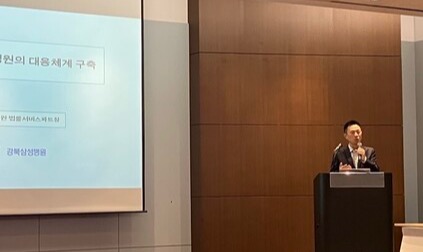The emergence of generative AI is changing how patients respond to medical incidents.
Whereas emotional appeals, such as anger and blame, were once predominant, the growing use of ChatGPT means hospitals now face sharp criticism from patients backed by precise information and logical reasoning.
Kwon Young-jik, Head of the Legal Services Department at Kangbuk Samsung Hospital, made this observation during a presentation titled “Medical Incident Occurrence and Hospital Response System Establishment” at the 2025 International Hospital and Health Tech Fair (K-HOSPITAL+HEALTH TECH FAIR, KHF 2025) held at COEX in Seoul on Thursday.

Medical lawsuits in Korea are steadily increasing.
At Kangbuk Samsung Hospital, which has 700 beds and treats over 3,500 outpatients daily, the Legal Services Department records at least 180 consultation cases annually. As medical lawsuits rise, the department's staff has grown to seven members.
“Medical disputes are also surging dramatically. Just searching news articles reveals the sheer scale, enough to earn this country the nickname ‘the Republic of Civil Petition,’” Kwon said. “In a hospital where life and death are decided and adverse outcomes occur, litigation seems inevitable.”
Major types of medical disputes include postoperative complications, side effects, and patient distrust due to insufficient explanations.
Patients raise the question, “Why should patients alone bear the burden of unavoidable aftereffects?” Hospitals explain the degree of negligence and limits of liability, but persuasion is difficult. Recently, disputes have expanded beyond simple civil lawsuits to include criminal complaints, disputes over refusal of treatment, and issues regarding access to medical records.
Furthermore, the emergence of ChatGPT is changing how patients respond to medical accidents.
“Recently, patients or guardians utilize ChatGPT to familiarize themselves with relevant laws and medical information before coming in, so when filing complaints, they present specific and sharp arguments rather than emotional appeals,” Director Kwon said.
It was an uncomfortable truth, but direct and incisive criticism regarding problems repeatedly occurring in hospitals is increasing, Kwon said, adding that ultimately, the core of responding to medical disputes is building a relationship of trust with the patient.
“Patients often attribute all outcomes from the moment they enter the hospital to the hospital's responsibility, making it difficult for them to readily accept fault ratios or liability limitations,” he noted. “Given the inevitable difference in perspective between patients and hospitals, objective review and communication to build trust are essential.”
Given that lawsuits can drag on for three to four years, reducing unnecessary waste and medical staff fatigue requires hospital-level participation in mediation and arbitration, along with swift settlements, Kwon noted.
“Hospital managers must also recognize compensation not merely as an expense but as a ‘defensive cost’ that reduces medical staff burnout and actively intervene,” he emphasized.

